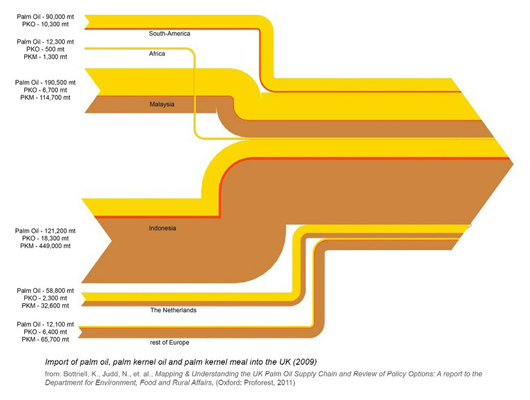UK: Mapping the UK palm oil supply chain
08.07.11
A new report, released by Proforest for Defra in May 2011, shows the scale and complexity of palm oil consumption in the UK.
Palm oil continues to be a major cause of controversy so this lengthy report represents a major leap forward in our knowledge of where and why the UK is consuming this commodity and may help the UK government make informed decisions about the future of palm oil use.
Some of the key findings from the report include (all 2009):
- About 595,000 metric tons of palm oil was imported into the UK, mainly from Malaysia, Indonesia, and Papua New Guinea and the Solomon Islands.
- About 660,000 metric tons of palm kernel meal was imported, mainly from Indonesia.
- At least 45,000 metric tons of palm kernel oil, again mainly from Indonesia.
- At least 350,000 metric tons of palm oil contained in finished products.

Flowchart of imported palm oil, palm kernel oil, and palm kernel meal into the UK (2009)
According to the report this is equivalent to approximately 1.2% of global palm oil and kernel oil production and approximately 10% of the global output of kernel meal.
At 68% the food industry uses the bulk of imported palm oil in the UK and the humble biscuit make up the largest share of this, with the report suggesting that over 20% of the total goes into these snacks.
But perhaps most surprisingly are the figures associated with animal feed. With 23% of palm oil and kernel oil, and over 80% of the kernel meal being used for animal feed.
Given the inextricable links between deforestation and palm oil production it is perhaps heartening that the quantities of palm oil imported to the UK have decreased by 40% over the past five years.
Download the full report (pdf)
Related links:
Indonesia: Forests to fall in the name of climate?
24.11.10
The tragedy of Indonesian forest clearance looks set to continue if a report released yesterday by Greenpeace is correct. Protection Money highlights how climate funds could, scandalously, bankroll deforestation across the archipelago of 17,000 tropical islands.
Indonesia: Round Table talks begin while palm oil production rises
09.11.10
The Roundtable on Sustainable Palm Oil (RSPO) has begun its latest round of talks in Jakarta, Indonesia. Established in 2004 the RSPO was a rapid response to the urgent need for more sustainably produced palm oil in a rapidly growing global market.